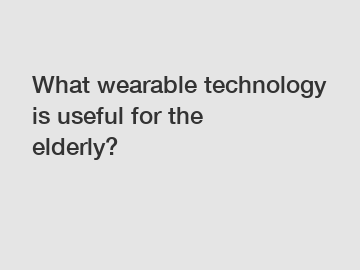What wearable technology is useful for the elderly?
What Wearable Technology is Useful for the Elderly?
With the advancements in technology, wearable devices have emerged as a revolutionary tool that offers great assistance to various age groups, especially the elderly. The aging population often faces health challenges and safety concerns, making wearable technology an important solution to address their needs. From health monitoring to emergency response, wearable devices provide valuable support and peace of mind for both the elderly individuals and their families.
Health monitoring is undoubtedly a crucial aspect for the elderly. Wearable devices such as smartwatches and fitness trackers offer features that can track vital signs, activity levels, and sleep patterns. These devices constantly monitor heart rate, blood pressure, and even analyze sleep quality, enabling the elderly to stay informed about their overall health status. This information can be shared with healthcare professionals, allowing them to detect any potential issues early on. Therefore, wearable technology serves as an effective means of promoting proactive healthcare and preventing serious health complications.

Moreover, wearable devices equipped with fall detection technology play a significant role in ensuring the safety of seniors. Falls are a major concern for the elderly, often resulting in severe injuries and a loss of independence. By wearing a smartwatch or pendant with fall detection capabilities, immediate help can be summoned in the event of an accident. These devices use sensors to detect sudden movements or changes in elevation and automatically send distress signals to designated contacts or emergency services. This prompt response significantly reduces the time between a fall and receiving assistance, potentially saving lives and minimizing the impact of injuries.
The integration of GPS technology in wearable devices brings additional benefits for the elderly. Those with cognitive impairments, such as dementia or Alzheimer's disease, may experience confusion and wander away from their caregivers' sight. GPS-enabled devices, like smartwatches or bracelets, enable real-time tracking of their location. This feature provides a sense of security to both the elderly individual and their loved ones, ensuring that they can be easily located if they become disoriented or lost. As a result, wearable technology grants a higher level of independence and freedom to seniors while reducing stress and anxiety for their families.
The significance and impact of wearable technology for the elderly cannot be overstated. It enhances the overall quality of life for this demographic by addressing their health concerns and promoting safety. Wearable devices empower the elderly to actively participate in their own well-being and manage their health proactively. Additionally, the peace of mind provided to family members, knowing that their loved ones are equipped with reliable technology, contributes positively to their mental and emotional well-being. Ultimately, the integration of wearable technology into the lives of the elderly fosters a greater sense of independence, security, and connectedness within society.
In conclusion, wearable technology offers immense value to the elderly population. From health monitoring to fall detection and GPS tracking, these devices prove to be essential tools for improving their overall well-being and safety. The advancements in wearable technology empower the elderly, allowing them to lead fulfilling lives while providing peace of mind to their families. As technology continues to evolve, the potential for even more innovative solutions to cater to the specific needs of the elderly remains promising.
Contact us to discuss your requirements of j style activity tracker, shoe pedometer, smart sleep belt. Our experienced sales team can help you identify the options that best suit your needs.

Comments